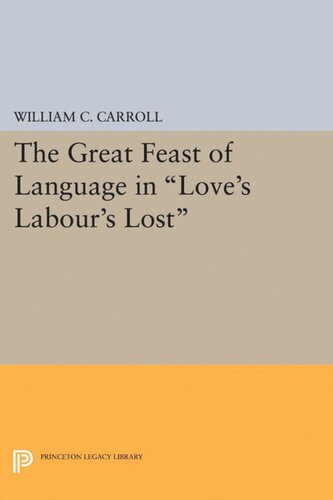

Most ebook files are in PDF format, so you can easily read them using various software such as Foxit Reader or directly on the Google Chrome browser.
Some ebook files are released by publishers in other formats such as .awz, .mobi, .epub, .fb2, etc. You may need to install specific software to read these formats on mobile/PC, such as Calibre.
Please read the tutorial at this link: https://ebookbell.com/faq
We offer FREE conversion to the popular formats you request; however, this may take some time. Therefore, right after payment, please email us, and we will try to provide the service as quickly as possible.
For some exceptional file formats or broken links (if any), please refrain from opening any disputes. Instead, email us first, and we will try to assist within a maximum of 6 hours.
EbookBell Team

4.0
16 reviewsThis book contends that in Love's Labour's Lost Shakespeare sought to discover the ways in which the imagination uses and abuses language. The author's critical reading shows that the characters are endowed with a wide variety of rhetorical disguises. Each assumes that his verbal and social point of view is correct, and the limitations and virtues of each viewpoint are explored as the drama unfolds.
In an elegant examination of theme and style, Professor Carroll heightens the reader's awareness of Shakespeare's marvellously inventive use of language. The author analyzes the different kinds of style, the characters' attitudes toward language, the play's theatrical modes, the frequent metamorphoses, and the debates. The term "debate"—justified by Shakespeare's use of the medieval conflictus—relates to both theme and structure. The author finds that the conflicting theories about the proper relation of language and imagination are resolved stylistically and thematically only in the final Debate between Spring and Winter, where the playwright reasserts the nature and value of good art.
Originally published in 1976.
The Princeton Legacy Library uses the latest print-on-demand technology to again make available previously out-of-print books from the distinguished backlist of Princeton University Press. These editions preserve the original texts of these important books while presenting them in durable paperback and hardcover editions. The goal of the Princeton Legacy Library is to vastly increase access to the rich scholarly heritage found in the thousands of books published by Princeton University Press since its founding in 1905.